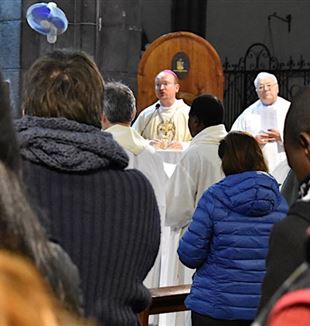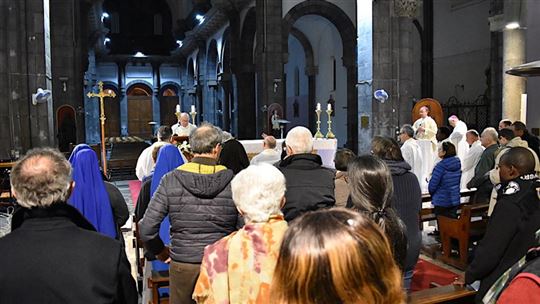
Lhernould: "The foundation of true liberation"
The homily of the Bishop of Constantine (Algeria) during Mass in memory of Fr. Giussani, concelebrated in Tunis with Ilario Antoniazzi, Archbishop of Tunis. “We are at the service of the truth that He is a person”.Dear friends, if you happen to visit the website of the CL movement founded by Fr. Giussani, whose departure for heaven we are celebrating today, you will find on the front page the following sentence: "Faith, lived in communion, is the foundation of the true liberation of man.”
In today's first reading, through which we continue to read the history of the Kings, we see an extraordinary counter-example of this truth. In fact, before the end of his life, King Solomon had debased himself and agreed to introduce idols into his kingdom. Eventually, one of his sons, Jeroboam, one day met the prophet Ahijah, whom we heard about today, who took a new cloak and cut it into twelve parts and gave ten to Jeroboam, saying to him, "I am going to tear the kingdom out of Solomon’s hands and give you ten tribes. But for the sake of my servant David and the city of Jerusalem, which I have chosen out of all the tribes of Israel, he will have one tribe”. And that is what happened. Jeroboam divided his father's kingdom, he founded the kingdom of the north which united ten of the twelve tribes of the elders. This kingdom became called the Kingdom of Israel. His brother Jeroboam remained master of the southern part of the Holy Land in the kingdom of Judah, possessing only one of the twelve tribes. It became a disastrous story: Jeroboam and Roboam became two execrable kings, so much so that at a certain point the prophet Ahijah himself had to return to the king to tell him that his son would die, whilst the two brothers continued to fight and divide their father’s kingdom. Through these terrible events that will rule the entire history of our ancestors for centuries, we see a perfect counter-example of the beautiful phrase, the opening of the horizon that is given to us on the CL website: "Faith, lived in communion, is the foundation of the true liberation of man”.
Throughout history, both of the Old Testament and the new history of our church, after the birth of Jesus, there have been moments of division. In our local history we can look at the figure of St. Cyprian. How many important people have had to fight to preserve the unity of the Church! Saint Cyprian wrote a famous treatise on this subject, but he is not the only one. Augustine, in his time, did the same, and many others after him. Even Cardinal Lavigerie, in other circumstances, had to make numerous efforts to maintain the joy of living faith in communion. There are many forces that claim division which, as in the time of Geroboam and Roboam, would like to drag us towards the opposite side.
It seems to me that here, in our small North African church, in the diversity of languages, cultures, spirituality and charisms, we are, perhaps more than elsewhere, called to profess the image of this unity. And not only to profess the image, but to live it, because through this experience of our faith in communion we can give witness of being his disciples. St. Cyprian, in his time, found the means to encourage the Christian community. St. Augustine, a few centuries later, did the same. It seems to me that within each of the charisms of our communities, we must broaden towards the same horizon, at the service of the same goal.
What does it mean to live faith in communion? It seems to me that, first of all, it is to accept the necessity of the other within ourselves. In fact, no one can claim to bear witness to the Gospel alone: to do this we at least need each other. Because the Gospel is love and love is not lived alone. God is one in three people and, in the same way, we are a witness through a multitude of people. The second necessity to live faith in communion is to deepen it in the intelligence of the environment in which we live. We know that CL is one of the many other proposals to educate in the religious sense and in Christian faith. Not to a Christian faith which is “up in the air”, as if we were anywhere else in the world, but within the same charism, identical whatever the continent, in the intelligence of the environment here, today, in Tunisia, which is no longer that of St. Cyprian and St. Augustine. In the encounter with the people of today, in radiating this religious sense that we welcome and deepen with reason and which, at the same time, we transmit through the appropriate means, adapted, proportionate to reality. Education in faith is never something that can be repeated, from one place to another, without additional elements. Faith is certainly the same everywhere but, at the same time, in order to communicate, to transmit itself it needs this intelligence of context, without which words, even what we try to live, do not communicate. Again, in today’s Gospel, we see a counter-example: Jesus healed a deaf and dumb man, in a wonderful way, and after this healing Jesus told people not to say anything to anyone. But the more he forbade it, the more they spoke about it. In another passage, one of the evangelists tell us that, after the healing of a leper, ever the leper does not obey Jesus and goes around spreading the news. The result: Jesus could no longer enter the villages. Was this what Jesus wanted?
The intelligence of being a witness needs to be able to discern methods according to context, according to the moment, according to people. If not, even if the truth remains the same, the way it is said can prevent it from being transmitted. It seems to me that through education to the religious sense there is something that here, in our little church in North Africa, we can donate and transmit. It is the need that we all perceive to be “adjusted`’ to our context. It is not relativism, far from it! It is simply the incarnation, very simply. It is to say that God is present on this earth, even before we have set foot here, that we are at the service of the truth that He is a person, that He is not first of all a matter of dogma, even if He will later decline in the form of dogma, but that He is first of all a person that, consequently, enters into relation with this context in order to love, serve and enlighten it.
Read also - Pierre: "Fr. Giussani calls us to be children of the heavenly Father"
Therefore, today, we want to give thanks for your charism, we want to give thanks for who you are, for your history, for your lives. Certainly, we want to give thanks for the life of your founder who left us, but also for all the members of the fraternity to which you belong and for the whole movement. What strikes me most about your movement, present today throughout the world, are the connections you make with other charisms. You bear witness to this on a daily basis in collaboration and in partnership through work, but also in personal relationships. This is exactly what we must seek: each one of us is themselves in the grace of his own charism, both personal and communal, when he accepts to receive others and to live the faith in communion with his different brothers.
So let us give thanks to the Lord, in the heart of the phrase that struck me today on the CL website, and which is much richer than this phrase: "Faith, lived in communion, is the foundation of the true liberation of man.” #FrGiussani